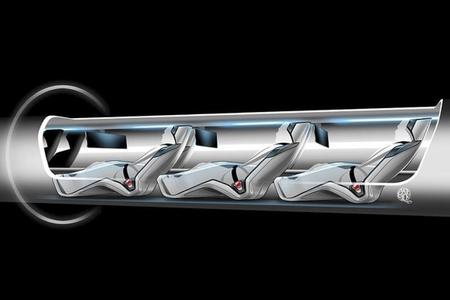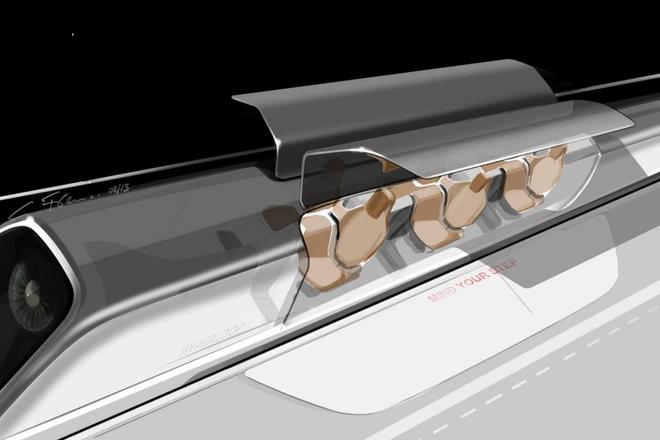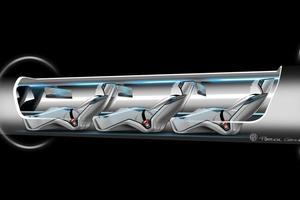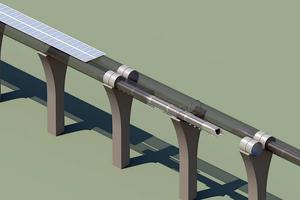THOUGH Bratislava still does not have an underground system, it could be close to obtaining one of the most advanced transport technologies in the world.
Representatives of the Economy Ministry and US company Hyperloop Transportation Technologies signed a memorandum of cooperation in early March, the American website The Verge reported. The plan now is to explore the potential of building a tube-based travelling system between Bratislava and Vienna by 2020, shortening the journey time from about an hour to eight minutes.
The project would definitely boost the prestige of Slovakia, analysts say, but add that the construction timeframe is unrealistic.
“It would be great if Slovakia participated in such a project, but there are too many unanswered questions about it,” Ľubomír Palčák of the Research Institute of Transport in Žilina told The Slovak Spectator.
The concept of Hyperloop is based on the idea of inventor and investor Elon Musk. It should enable the transport of people and goods by tubes at some 1,200 kilometres per hour, driven by solar energy. It is generated from solar panels placed on the surface of the tubes. Since the tubes would need only 10 percent of the energy generated for their operation, the rest would be distributed to nearby customers, the Economy Ministry explained in a press release.
Only a preliminary agreement
The Hyperloop concept is developed only by two companies: Hyperloop Technologies and Hyperloop Transportation Technologies (HTT). The CEO of the latter, Dirk Alhborn, has been travelling the world looking for foreign governments willing to accept the gospel of the Hyperloop, according to The Verge.
“A transportation system of this kind would redefine the concept of commuting and boost cross-border cooperation in Europe,” Economy Minister Vazil Hudák said, as quoted by the website.
Though some media have reported that the document inked by the Economy Ministry and HTT stipulates the company will have the new transport system in Bratislava by 2020, ministry’s spokeswoman Miriam Žiaková stressed that the agreement is only preliminary.
The signatories only agreed on checking the possibilities to build the system in Slovakia, and that they will share the construction costs. If the analysis shows the project is advantageous for Slovakia, the country will enable the company to build a prototype, the Sme daily reported.
Connecting Europe
Establishing a connection between Bratislava and Vienna would be only a beginning for using the system in Europe. Slovakia was picked mostly because of its positioning as a “technological region”, as Ahlborn called it.
Moreover, Bibop Gresta, the flamboyant chief operating officer of HTT, pointed to the whole region’s rich transportation history, such as the first underground train in Budapest and the first electric train line between Bratislava and Vienna.
“Slovakia continues to confirm its position as one of the most forward-thinking countries by embracing innovations like the Hyperloop transportation system,” he said, as quoted by The Verge.

After connecting Bratislava with Vienna, there is a plan to build a link also to Budapest, and then to other cities. The transport system of this kind would then pre-define the concept of commuting and intensify cross-border cooperation in Europe, Žiaková said.
“The Hyperloop project would connect not only European cities, but also businesses, academia and research institutions,” Žiaková added, as quoted in the press release. “Its expansion would boost the demand for innovations and creation of new innovative junctions in Slovakia and all of Europe.”
Ahlborn meanwhile told the Nový Čas daily that he will soon launch talks with both Austria and Hungary.
State Secretary of the Austrian Federal Ministry of Science, Research and Economy Harald Mahrer said that his country is highly interested in cooperation in the project. Informal talks were already held with Slovakia last month, and Mahrer already met with Hudák in Bratislava on March 14, Mahrer’s spokesman Eduard Posch told The Slovak Spectator.
“The intention of the Hyperloop project is to put our countries and the twin-city-region on the world innovation map as a region which is taking an active approach to innovation, technology, and green environmental solutions,” Posh added.
Feasibility study missing
Palčák says that the transport system needs this kind of vision as there has always been demand for mobility and the current systems will not be able to bear the capacities in the future.
Moreover, Slovakia has enough skilled people to implement the project.
On the other hand, the memorandum is not clear enough and it is not clear how much the project would cost, what benefits it would bring to Slovakia or how many people would use it for commuting.
“In order to know whether the project is profitable or not we need a feasibility study,” Palčák stressed.
Since these questions are still open, he doubts the project would be finished by 2020.


 How a Hyperloop tube might look. (source: AP/SITA)
How a Hyperloop tube might look. (source: AP/SITA)

